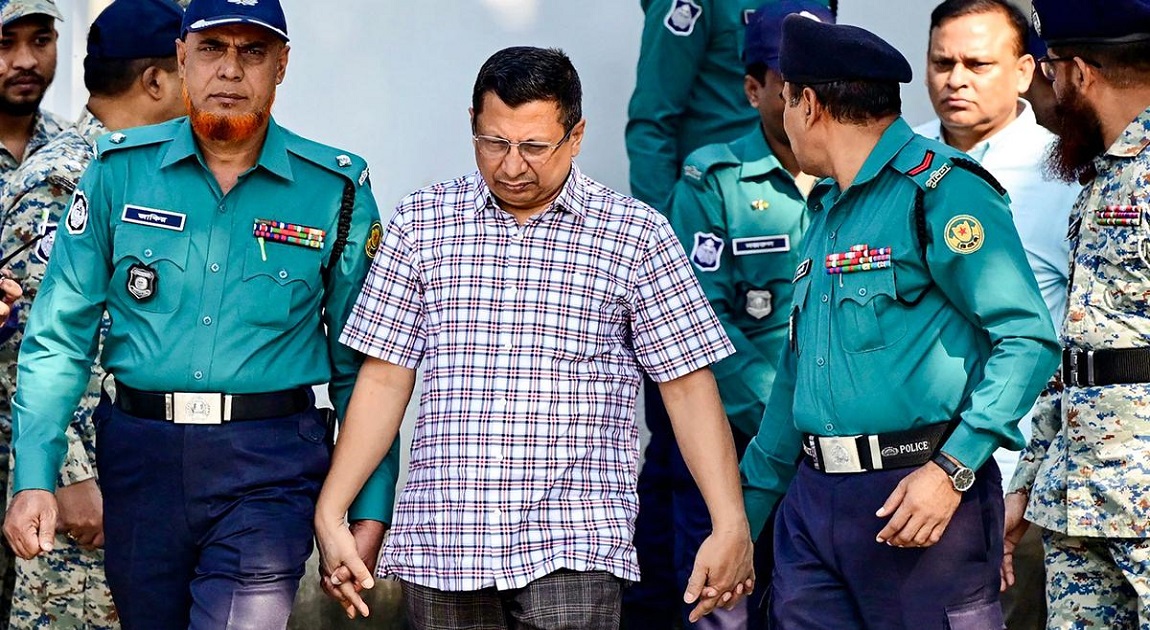In a startling deposition submitted to a Dhaka court, former Inspector General of Police (IGP) Chowdhury Abdullah Al-Mamun has revealed that the use of helicopters to open fire on demonstrators during the July 2024 mass uprising was a politically motivated decision.
He also disclosed that block raids were organized to suppress the protests and that deadly force was used under direct orders from then-Prime Minister Sheikh Hasina.
The statement, submitted on March 24 before the Chief Metropolitan Magistrate`s Court in Dhaka as part of a case at the International Crimes Tribunal, offers extensive details about government-sanctioned violence, election manipulation, secret detentions, and forced disappearances during the final years of the Hasina administration.
Mamun, who served as IGP from 2022 until the fall of the government, is now under arrest and has turned approver in a case concerning crimes against humanity.
According to his testimony, daily meetings were held at the residence of then-Home Minister Asaduzzaman Khan Kamal during the height of the uprising in July-August 2024.
Attendees included top law enforcement and intelligence officials, where plans for suppressing the protests, including the use of lethal weapons and strategic block raids in restive areas, were discussed and approved.
Mamun claimed that the deployment of helicopters for surveillance and firing on protesters was executed based on a secret plan devised by RAB Director General Harun-or-Rashid, with army support. “It was a political decision,” Mamun stated, distancing himself from direct involvement in the helicopter operation as police chief.
He further said that Home Minister Kamal informed him that the use of deadly weapons had been authorized following direct instructions from Prime Minister Sheikh Hasina. The directive was communicated in the presence of senior police officials, including Additional DIG Proloy Joarder and DMP Commissioner Habibur Rahman.
Mamun`s deposition also points to enthusiastic involvement by key police officials in suppressing dissent. He named DMP Commissioner Habibur Rahman and Detective Branch (DB) Chief Harun-or-Rashid as particularly eager to use lethal force. According to Mamun, “The Home Minister was determined to crush the movement by any means necessary.” He claimed that on July 18, 2024, Commissioner Rahman publicly instructed officers to open fire using Chinese rifles.
He added that student and youth wings of the ruling party, notably the Chhatra League and Jubo League, carried out attacks on student demonstrators at Dhaka University, often with the police standing by. Senior Awami League leaders, including Obaidul Quader and Jahangir Kabir Nanak, allegedly ordered these actions.
Mamun stated that a broad group of pro-government journalists, intellectuals, and security officials supported the violent crackdown. Daily meetings at the Home Minister`s house from July 19 involved senior figures from the police, intelligence agencies, BGB, RAB, Ansar, and military intelligence agencies, including DGFI and NTMC. These sessions, Mamun testified, discussed the coordination of arrests and coercion of protest leaders, including psychological torture and forced televised statements.
In a particularly chilling detail, he revealed that the decision to arrest leaders of the anti-discrimination movement was made in one such meeting. Despite his own objections, he said, DGFI and DB carried out the arrests and applied pressure on the detainees and their families to force a public withdrawal from the movement.
Mamun described two key meetings on August 4, 2024, the day before the government fell. The first, held at 11 AM at the Prime Minister’s residence, involved national security chiefs and focused on protest suppression. He noted the government was not open to hearing intelligence warnings about the gravity of the situation. A second meeting took place at 10 PM that night with top government and military leaders, including Sheikh Hasina and her sister Sheikh Rehana. Plans for deploying forces to halt a mass protest on August 5 were discussed, and control points were established across Dhaka.
On August 5, however, the tide turned. Mamun stated that from 10 AM, mass gatherings began at key entry points into Dhaka, including Uttara and Jatrabari. By 11 AM, crowds began entering the capital unimpeded. He learned that field-level army officers had refused to intervene, effectively siding with the protesters. As the situation spiraled out of control, Mamun realized by early afternoon that the government was on the verge of collapse. By evening, he was flown via helicopter to a military mess for refuge.
Mamun’s statement also touches on allegations of election fraud in the 2018 general elections, which he described as “midnight voting.” At the time, he served as DIG of the Dhaka Range and claimed that then-IGP Javed Patwary advised Prime Minister Hasina to stuff ballot boxes with approximately 50% of the vote the night before the election. He said civil and police administration officials were actively involved, and officers loyal to the ruling party were later rewarded with service medals.
The former IGP also admitted knowledge of enforced disappearances and secret detention facilities during his tenure as Director General of RAB from April 2020 to September 2022. He detailed the operation of the TFI cell in RAB-1`s Uttara compound and other hidden detention cells across RAB units. According to him, political dissidents were routinely abducted, interrogated, tortured, and detained without trial under a culture sanctioned within RAB.
Mamun claimed he had heard that orders for such operations came directly from the Prime Minister’s Office, and occasionally from her security advisor, retired Major General Tarique Siddique. He admitted he took no action to investigate or stop such activities, even after becoming the police chief, stating, “I could not act against them because these decisions came from other forces and intelligence agencies.”
In the final section of his five-page deposition, Mamun expressed remorse:
“As former police chief, I am ashamed, regretful, and seek forgiveness for the indiscriminate violence, arrests, and killings committed under government orders during the suppression of the anti-discrimination movement. I submit this statement to describe my role and provide a full picture of those events.”














-20260226080139.webp)





-20260225072312.webp)








-20260219054530.webp)
-20260224075258.webp)





-20260221022827.webp)